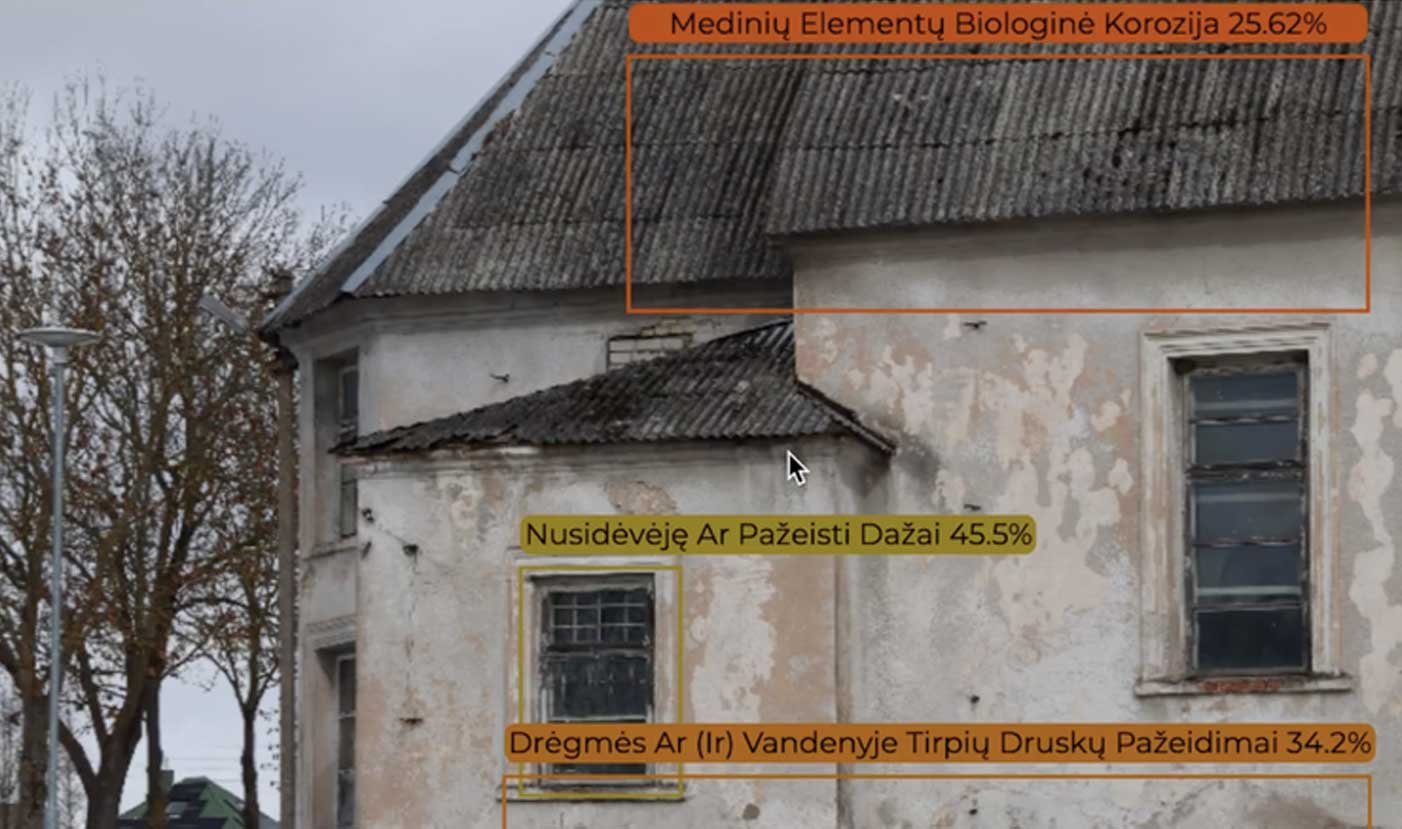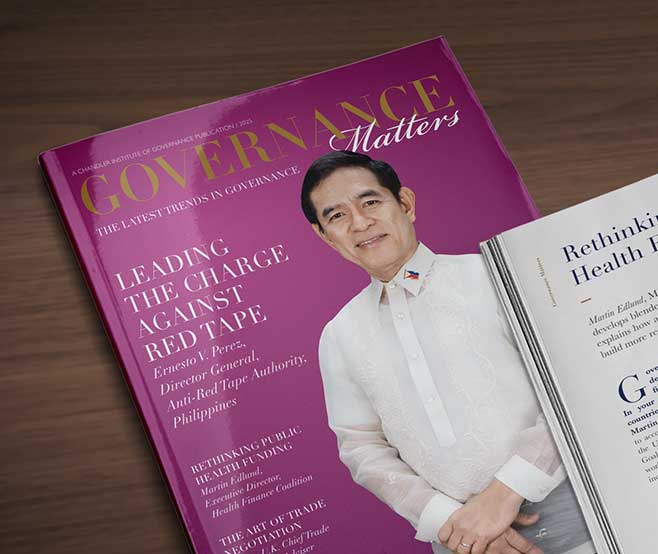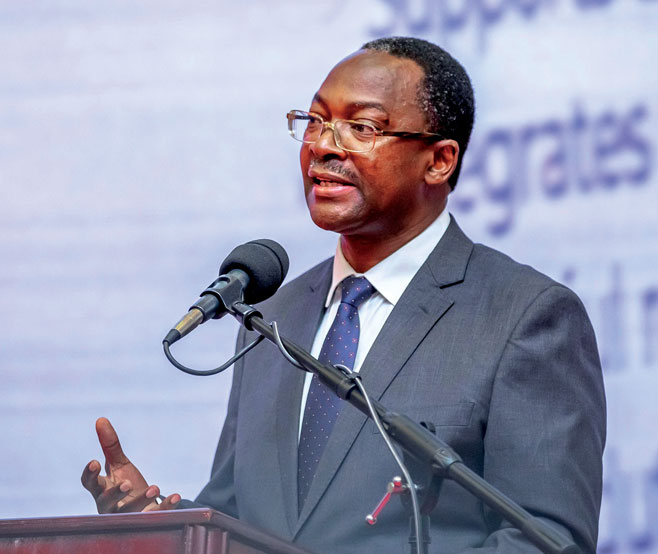Government’s Voice of the Future
Sophie Howe was the world’s first Future Generations Commissioner. From her work with the Welsh Government, she shares insights into how any country can prioritise well-being and sustainability.
Lorem ipsum dolor sit amet, consectetur adipiscing elit, sed do eiusmod tempor incididunt ut labore et dolore magna aliqua. Ut enim ad minim veniam, quis nostrud exercitation ullamco laboris nisi ut aliquip ex ea commodo consequat. Duis aute irure dolor in reprehenderit in voluptate velit esse cillum dolore eu fugiat nulla pariatur.
Heading 1
Heading 2
Heading 3
Heading 4
Heading 5
Heading 6
Lorem ipsum dolor sit amet, consectetur adipiscing elit, sed do eiusmod tempor incididunt ut labore et dolore magna aliqua. Ut enim ad minim veniam, quis nostrud exercitation ullamco laboris nisi ut aliquip ex ea commodo consequat. Duis aute irure dolor in reprehenderit in voluptate velit esse cillum dolore eu fugiat nulla pariatur.
Block quote
Heading 6
Ordered list
- Item 1
- Item 2
- Item 3
Unordered list
- Item A
- Item B
- Item C
Bold text
Emphasis
Superscript
Subscript
Governance Matters: Why did Wales pass the Wellbeing of Future Generations Act and create the role of a Commissioner for Future Generations?
Sophie Howe: In 2014, the Welsh Government formed “The Wales We Want National Conversation”. In the face of numerous challenges such as climate change, poverty, and risks to health and wellbeing, the Welsh people united to think about the Wales that they wanted to leave behind. The national dialogue created a collective vision and set of priorities. These eventually formed the basis of the wellbeing of Future Generations Act that was passed in 2015. We were the first country in the world to enshrine in law a duty to protect future generations.
The Act requires public bodies in Wales to think about the long-term impact of their decisions, to work better with people, communities, and each other, and to prevent persistent problems such as poverty, health inequalities, and climate change. It is structured around seven well-being goals. These are to build a prosperous Wales, a resilient Wales, a healthier Wales, a more equal Wales, a Wales of more cohesive communities, a Wales of vibrant culture and thriving Welsh language, and a globally responsible Wales.
Under the Act, a Commissioner for Future Generations was appointed to monitor and support the implementation of these policies. He or she is essentially the guardian of the interests of future generations in Wales and supports the public bodies listed in the Act to work towards achieving the well-being goals.
The Act was built upon a national conversation across Wales. Why was it important to draft the Act from the outcomes of that conversation?
Anticipatory governance is important and there are obvious advantages in governments applying strategic foresight and trying to get ahead of the problems we will face in future. There are three critical elements I would raise that are related to this.
First, it must be informed by citizen participation and dialogue. Citizens need to be engaged in imagining a future that they want for their country. Second, there need to be systems and processes embedded within government to ensure that listening to citizens is not a one-off engagement, but a sustained conversation that goes deep enough to help us prevent problems and identify their root causes. Third, we should ensure that all generations are engaged consistently in the national conversation so that the key policymakers are making fair decisions for everyone.
Can you tell us about a specific instance when you as Future Generations Commissioner were able to shape public service?
In 2021, I played a role in convincing the Welsh Government to freeze all road-building projects, a decision that it made permanent earlier this year. My argument was that building new roads would not actually fix the problem of traffic congestion. In the case of Wales, we can build more roads, but people will keep buying cars, there will still be traffic, and there will also be an increase in carbon emissions, air pollution, and health risks. This also does not address inequality issues, because lower-income groups are more likely to use public transport.
As Commissioner, I sought to find out how the Government had considered future generations, long-term implications, and the seven well-being goals when they were deciding to build more roads. If we define a prosperous Wales as a productive, innovative, low-carbon society which uses resources efficiently and acts on climate change, how could they justify building roads? Further, how would this decision affect Wales’s enhancement and maintenance of nature and biodiversity?
It was shocking when the Government announced it would freeze the road-building programme because it was long regarded as a done deal. Often, when faced with an economy-environment dichotomy in policymaking, the environment loses out. In this case, we played out all the elements of sustainability and the Government prioritised the seven well-being goals. Instead of building a road, there is now increased investment in promoting active travel and public transport use, completely reforming Wales’s transport strategy.
What were some challenges you faced as Future Generations Commissioner and how did you overcome them?
The biggest challenge was unpicking some of the lifelong habits within the civil service. There is an entrenched culture of working in silos, managing a tight annual budget, and being judged by short-term performance metrics. There was also the challenge of dealing with legislation that had been written before the Future Generations Act. The decision to build more roads was part of a 2008 transport strategy, so we had to go back and look at things that were already in motion.
A crucial factor in overcoming challenges is identifying the participants in the system who can see your rationale and who are willing to work with you. Often, they are frustrated champions and lone voices in a system despite, for a long time, having been able to see a better way of doing things. They could be doctors frustrated that generations of the same family have been consistently plagued by preventable health issues, or highway engineers who are aware that building roads is a mere short-term solution. Engaging with and supporting such people can help to transform the system.

What are some ways in which practitioners can identify these champions in their own areas of work?
We set up networks with people in different sectors, gathering information on lesser-known matters and best practices. We found that many champions remain undaunted and work hard to do good things despite limitations in the system. Often highlighting them and letting others know you are there to support them can help.
I recall an incident involving the merger of 13 office sites being carried out by our public health agency several years ago. The estate manager bravely spoke up against just minimally adhering to the traditional procurement framework – which is great for ensuring purchases are value for money and fair, but it does not support the Government’s priority in reaching net zero. Highlighting that a public health agency should be guided by the priorities of reducing carbon emissions and improving the nation’s health, she embarked on a hugely challenging but highly sustainable procurement process. She recycled all the furniture, worked with a social enterprise to procure office carpets, and channelled the cost savings into providing carpets for low-income families.
What she did had a significant impact on future generations and contributed to our overall well-being goals. I highlighted and supported what she did and I saw the ripple effect of doing so – everyone wants to be part of a new way of doing things now.
You published the Future Generations Report in 2020 to assess the improvements public bodies in Wales should make in relation to their objectives. What key recommendations did you make?
The Report is the Commissioner’s five-year assessment of the progress made and recommendations going forward. It was timed to come out ahead of the elections to the Welsh Senedd (Parliament) in 2021 so that the recommendations that were made could be taken on board by the political parties. With the Act covering every policy area that is relevant to people now and into the future, it was a huge challenge to assess everything that has been happening and to make those recommendations.
Many of these were taken on by the political parties and became part of the programme of Government in Wales. One recommendation I had hoped would gain more traction was the establishment of a Minister for Prevention who would have responsibility for taking a whole-of-government, coherent, and evidence-based approach to investing in prevention. This would go alongside taking money out of budgets across the public sector to be specifically devoted to preventative interventions. I encountered opposition to this idea, but I would argue that focused intervention backed by resources would really help in dealing with acute issues such as an increased demand for healthcare and the effects of a changing climate.

What powers or processes are most critical in enabling the work of a Future Generations Commissioner?
While legislation can monitor and assess progress, I found that softer powers make a bigger difference. We are building momentum around the delivery of the Future Generations Act, engaging the whole of Wales, and providing advice on setting well-being objectives. As Commissioner, I made real progress by bringing together champions and being able to use my position to convince leaders of the need to adopt measures for change.
One example of engaging stakeholders was my work with the Football Association of Wales (FAW). Last year, Wales went to the World Cup for the first time in 64 years. That really captured the national imagination and actually FAW’s chief executive had been motivated to apply for the job because of the Future Generations Act and the chance to use football to contribute to the nation’s health and to set an example on sustainability. Days before the team left for the World Cup, we co-launched FAW’s first-ever sustainability strategy, called “Cymru, Well-being and the World”. The FAW set out its ambition to become a leader in sustainability in sport, as well as to use its influence during the World Cup to further highlight the wellbeing goals.
A crucial factor in overcoming challenges is identifying the participants in the system who can see your rationale and who are willing to work with you.
What advice do you have for other government leaders who may be thinking about implementing a Future Generations Act in their country? What are some considerations they should have?
With the United Nations’ Sustainable Development Goals, countries are increasingly prioritising wellbeing by creating wellbeing budgets and monitoring wellbeing metrics such as quality of life indexes. Governments are also applying foresight, futures thinking, and anticipatory governance in their systems. It is rare to find countries doing all of these. When you do find them, they are doing it in silos. This impedes their ability to develop and deliver the sustainable development goals, which are only achievable through integrating long-term thinking, foresight, scenario planning, and preventative interventions.
Many governments have a Department of Sustainability, an arm focused on foresight, and perhaps a finance minister managing well-being metrics. My first piece of advice is to integrate and sync these work streams. Second, avoid following the metrics blindly without systems transformation. Instead of basing your entire plan around certain proximate indicators, you should consider how it contributes to your ultimate goals overall. For example, achieving net zero carbon emissions is critical for future generations, but if our sole mission is to achieve net zero without thinking holistically, we would risk missing out on a just transition and opportunities to drive progress on biodiversity.

Heading 1
Heading 2
Heading 3
Heading 4
Heading 5
Heading 6
Lorem ipsum dolor sit amet, consectetur adipiscing elit, sed do eiusmod tempor incididunt ut labore et dolore magna aliqua. Ut enim ad minim veniam, quis nostrud exercitation ullamco laboris nisi ut aliquip ex ea commodo consequat. Duis aute irure dolor in reprehenderit in voluptate velit esse cillum dolore eu fugiat nulla pariatur.

Block quote
Ordered list
- Item 1
- Item 2
- Item 3
Unordered list
- Item A
- Item B
- Item C
Bold text
Emphasis
Superscript
Subscript
Lorem ipsum dolor sit amet, consectetur adipiscing elit, sed do eiusmod tempor incididunt ut labore et dolore magna aliqua. Ut enim ad minim veniam, quis nostrud exercitation ullamco laboris nisi ut aliquip ex ea commodo consequat. Duis aute irure dolor in reprehenderit in voluptate velit esse cillum dolore eu fugiat nulla pariatur.
Endnotes
- Item 1
- Item 2
- Item 3


Sophie Howe served as the first Future Generations Commissioner for Wales between February 2016 and January 2023. Prior to this role, she was the first Deputy Police and Crime Commissioner for South Wales and the only woman in a police commissioner leadership role in Wales. She has also served as a Welsh Government Special Advisor. She is currently a member of the Wales Committee of the Equality and Human Rights Commission and is Chair of the Network of Institutions for Future Generations.
Lorem ipsum dolor sit amet, consectetur adipiscing elit, sed do eiusmod tempor incididunt ut labore et dolore magna aliqua. Ut enim ad minim veniam, quis nostrud exercitation ullamco laboris nisi ut aliquip ex ea commodo consequat. Duis aute irure dolor in reprehenderit in voluptate velit esse cillum dolore eu fugiat nulla pariatur.













